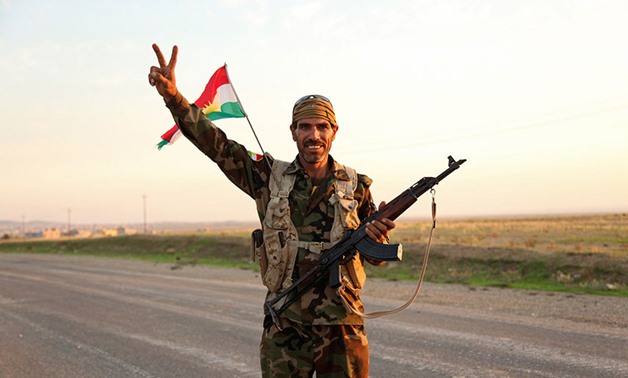
VICTORY: A member of the Kurdish peshmerga just after the forces retook Zumar in October 2014. REUTERS/Ari Jalal
SULAIMANIYA, Iraq - 19 December 2017: Three people were killed and more than 80 wounded on Tuesday when Kurdish demonstrators joined a second day of protests against years of austerity and unpaid public sector salaries amid tensions between their region and Baghdad.
Iraqi Prime Minister Haider al-Abadi said later he would take action if any citizen were assaulted in Iraq's northern semi-autonomous Kurdistan region.
About 1,250 protesters, mostly teachers, students, and civil servants, protested in the city of Sulaimaniya.
The Sulaimaniya provincial council told Reuters three people were killed during clashes with Kurdish security forces in the town of Ranya. Regional health officials said six people were injured when the crowd was shot at with rubber bullets and sprayed with tear gas by security forces.
Protesters also attacked several offices of the main political parties in Sulaimaniya province on Tuesday.
Acknowledging that protesters had a "legitimate right" to demonstrate, Iraq's Kurdistan Regional Government (KRG) nonetheless said the targeting of government offices and party headquarters in Sulaimaniya province was unacceptable.
"We are concerned with the uncivil actions and the violence used today in a number of cities and towns across Kurdistan," a KRG statement said.
It warned that relevant authorities could intervene to prevent further damage after several people were left injured and property was damaged.
Later on Tuesday, Kurdish Asayish security forces raided the offices of Kurdish private broadcast NRT in Sulaimaniya, and took the channel off the air, its head told Reuters. The channel was no longer accessible.
NRT's chief also said the broadcaster's founder, Shaswar Abdulwahid, was arrested as he landed at Sulaimaniya airport on Tuesday evening.
Last month, Abdulwahid said he sold the broadcaster after launching a new political opposition movement, the New Generation. He had agitated against September's referendum on Kurdish independence, leading NRT's offices to be attacked by a mob in August.
At a weekly news conference, Abadi called on the KRG to respect peaceful protests.
"We will not just stand by and watch if citizens are oppressed. The Iraqi citizen is an Iraqi citizen everywhere and if there is an attack or violation against citizens in a way that contradicts the constitution we will punish those responsible," Abadi said.
"We want there to be freedom for expression and assembly for citizens in the Kurdistan region."
Local officials imposed a curfew starting at 7pm (1600 GMT) in several towns including Kifri, Takya and Chamchammal in Sulaimaniya province. In Chamchammal, the curfew will last throughout the day on Wednesday.
ROADS CLOSED
Tension has been high in the region since the central government in Baghdad imposed tough measures when the KRG unilaterally held an independence referendum on Sept. 25 and Kurds voted overwhelmingly to secede.
The move, in defiance of Baghdad, also alarmed neighbouring Turkey and Iran who have their own Kurdish minorities.
For the second day, protesters demanded that the KRG quit.
They set fire to the offices of Kurdish political parties in the towns of Koya, Kifri and Ranya. Officials have closed roads around Sulaimaniya, a Reuters witness said.
Security sources said the road between Darbandikhan and Sulaimaniya, which connects the city to southern towns where there are major protests, has been closed.
On Monday, Kurdish political offices were also set ablaze in Sulaimaniya province, including a building belonging to the ruling Kurdish Democratic Party (KDP) and one belonging to its coalition partner in government, the Patriotic Union of Kurdistan (PUK).
At least 3,000 Kurdish demonstrators had gathered in Sulaimaniya for the protests on Monday against the KRG.
Stringent economic measures taken after the Baghdad central government slashed funds to the KRG in 2014 when it built its own oil pipeline to Turkey in pursuit of economic independence have led to sporadic protests over unpaid civil servant salaries in the last three years.
After the September referendum, the Iraqi government responded by seizing Kurdish-held Kirkuk and other territory disputed between the Kurds and the central government. It also banned direct flights to Kurdistan and demanded control over border crossings.


Comments
Leave a Comment